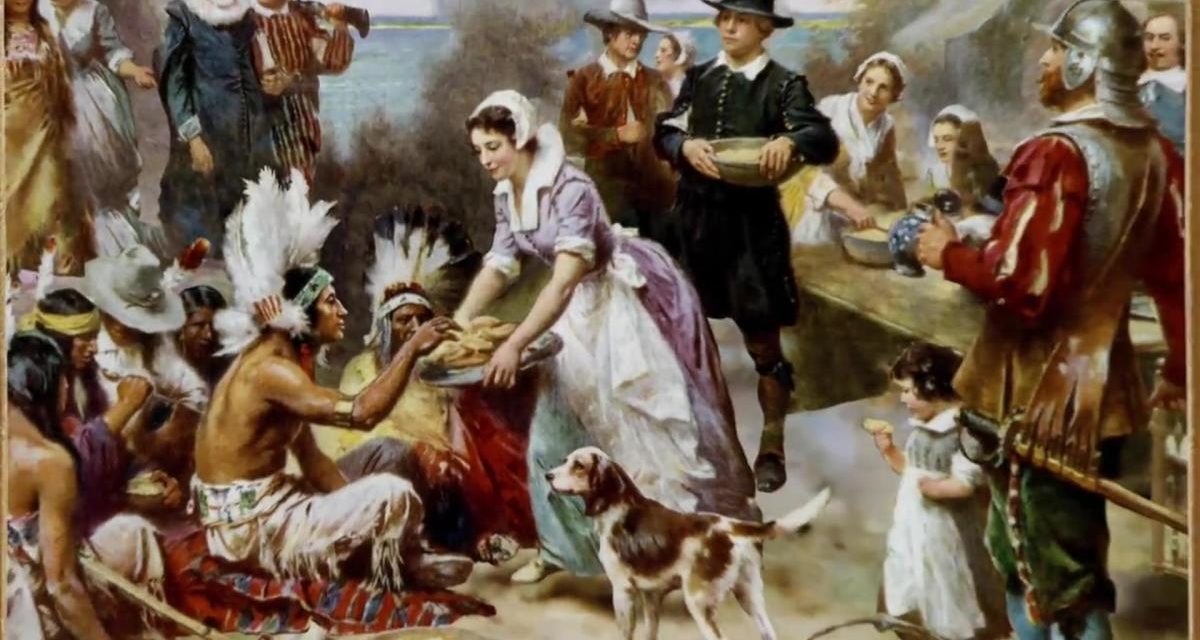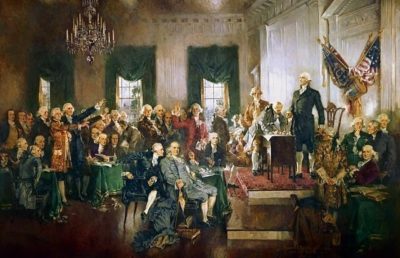Thanksgiving is a particularly American holiday. In 1621, Plymouth Colony Gov. William Bradford called for the first official Thanksgiving Feast to thank divine providence for the abundant harvest reaped by the pilgrims, the men, women and children who had settled on Cape Cod Bay the previous December.
They invited about 90 Wampanoags, their Algonquin-speaking neighbors, who had taught them what would grow and how to grow it in the New England soil. Together, the 53 pilgrims and Native Americans feasted for three days on corn, venison and fowl.
It was an auspicious beginning, but it didn’t last. By 1675 King Philip’s War erupted between the colonists and several of the Native American tribes as they fought to stop the encroachment of European settlements. The resulting loss of life, as a percentage of the total population, represented the highest number of casualties ever experienced by the land that became America.
Thanksgiving, as local, colony or state celebrations, was celebrated on and off between 1621 and 1789. On Oct. 3, 1789, the first President of the United States George Washington established Thanksgiving as a national holiday. His proclamation was made a little more than a year after the adoption of the new United States Constitution.
The United States Constitution was born in September 1787, four years after the Treaty of Paris was signed in 1783. But it took until June 21, 1788, for the document to be adopted, when New Hampshire became the ninth state to ratify it. What the Founding Fathers signed became the most influential document in American history. The United States Constitution established the framework of our government and the rights and freedoms that “We the People” enjoy today.
Around the time of the ratification, Congress introduced a resolution to “wait on the President of the United States, to request that he would recommend to the people a day of public prayer and thanksgiving.” Interestingly enough, in the political party system of the day, that resolution was opposed by Anti-Federalists, who took issue with increased power for the central government.
Washington had only been installed as the first president of the United States six months earlier, on April 30, 1789, following the adoption of the constitution. So when he issued his proclamation, he was already bucking anti-federalist sentiment, ironically against something that has become an American institution. His Thanksgiving proclamation acknowledges the importance of giving thanks. But it also stands as a testimony to his unwavering belief in the Constitution of the United States as its governing document.
Washington’s proclamation read, in part:
“Now, therefore, I do recommend and assign Thursday, the twenty-sixth day of November next, to be devoted by the people of these States to the service of the great and glorious being, who is the Beneficent Author of all the good that was, that is, or that will be, that we may then all unite in rendering unto Him our sincere and humble thanks for His kind care and protection of the people of this country, previous to their becoming a nation, for the signal and manifold mercies, and the favorable interposition of His providence, in the course and conclusion of the late war; for the great degree of tranquility, union, and plenty, which we have since enjoyed; for the peaceable and rational manner in which we have been enabled to establish constitutions of government for our safety and happiness, and particularly the national one now lately instituted; for the civil and religious liberty with which we are blessed, and the means we have of acquiring and diffusing useful knowledge; and in general, for all the great and various favors, which He has been pleased to confer upon us.
And also that we may then unite in most humbly offering our prayers and supplications to the great Lord and Ruler of Nations and beseech him to pardon our national and other transgressions, to enable us all, whether in public or private stations, to perform our several and relative duties properly and punctually, to render our national government a blessing to all the people, by constantly being a Government of wise, just, and constitutional laws, discreetly and faithfully executed and obeyed, to protect and guide all Sovereigns and Nations.”
Proclamation of the First National Thanksgiving
George Washington
Oct. 3, 1789









Recent Comments